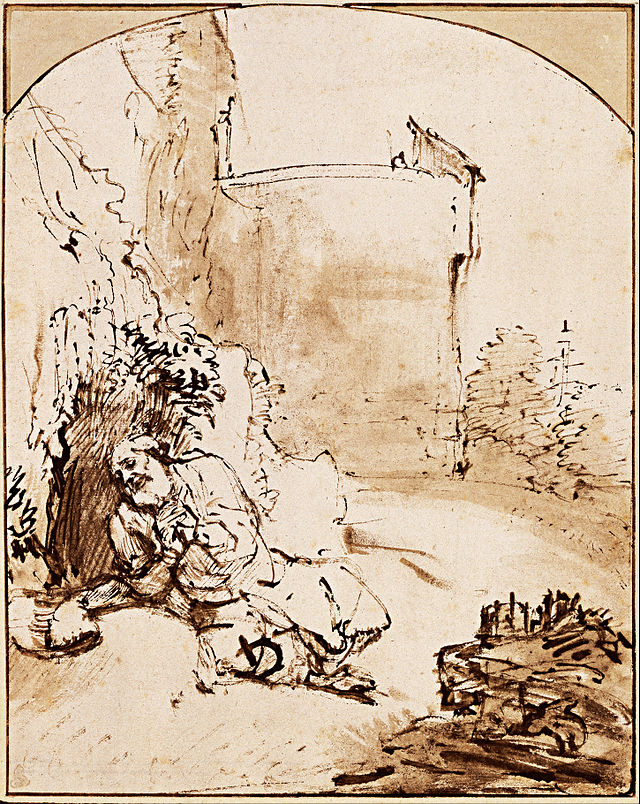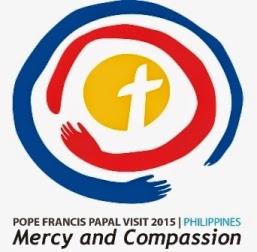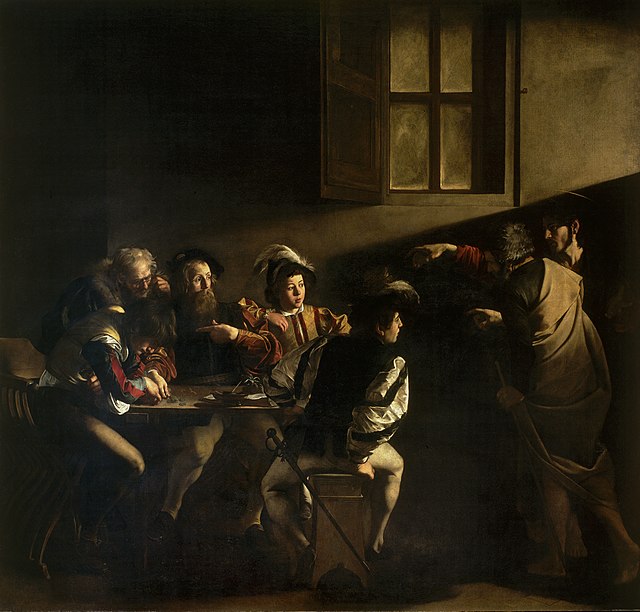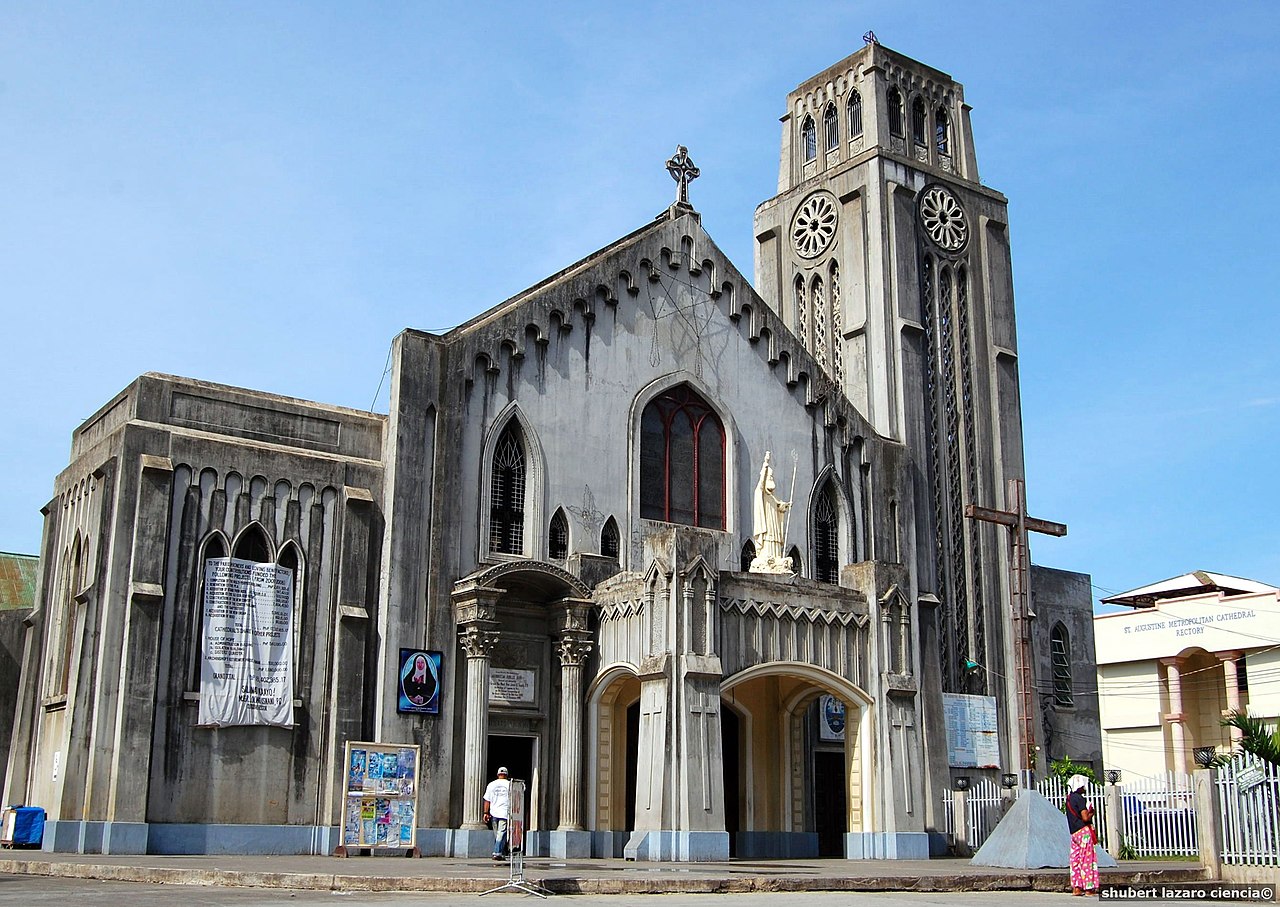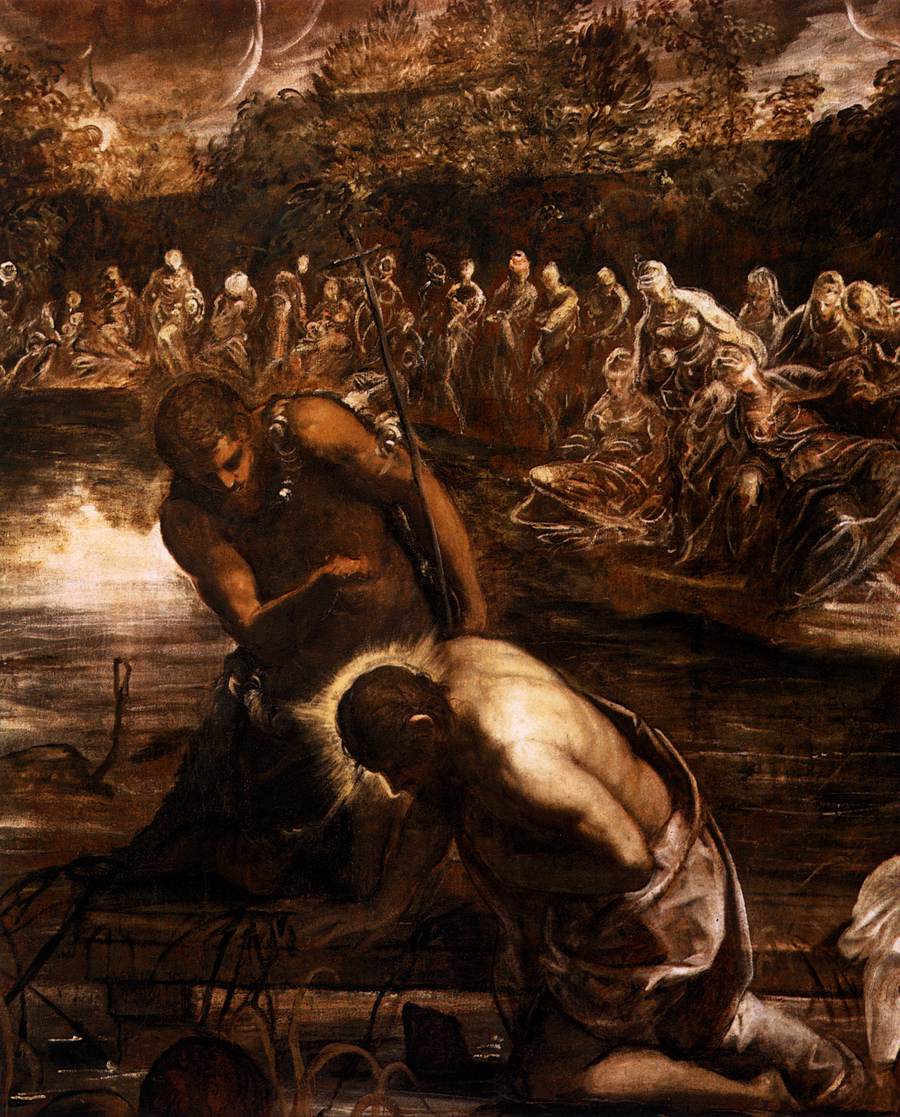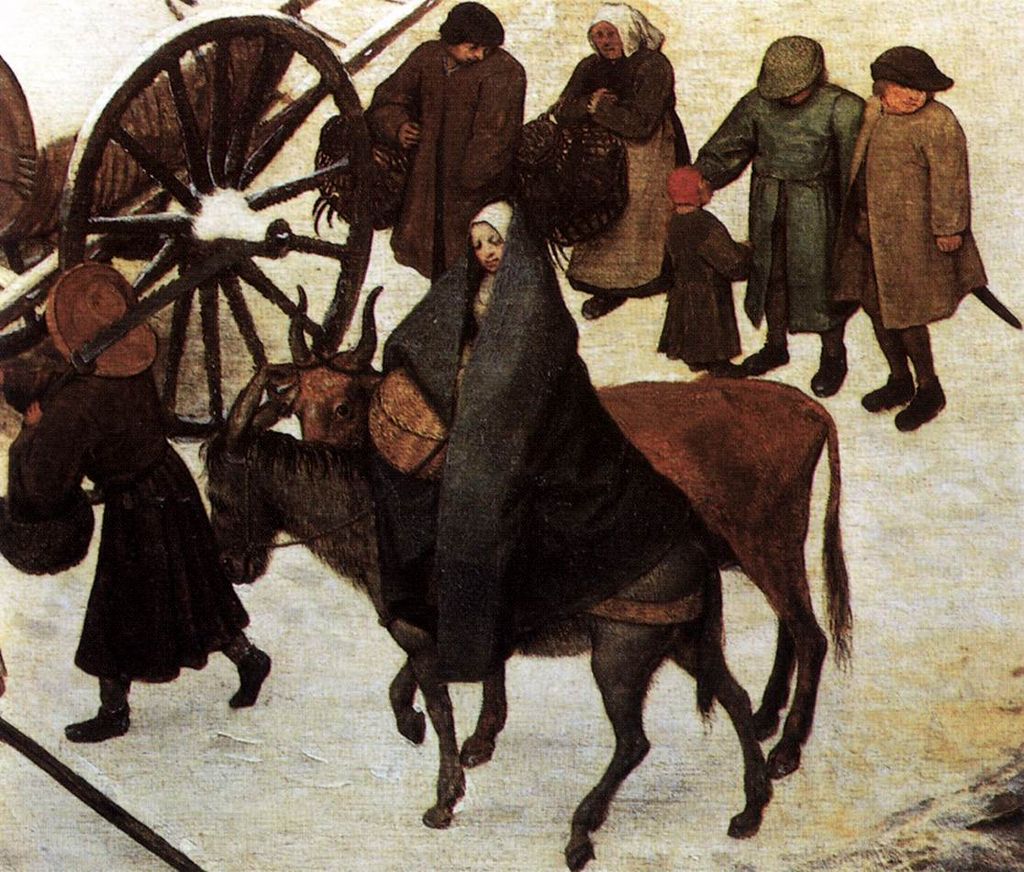
Fr Daniel M. Baragry
11 May 1930 – 9 January 2015
The homily at the funeral Mass of Fr Daniel M. Baragry on Tuesday 13 January was given by his nephew Fr Daniel Baragry CSsR, the newly-elected Provincial of the Dublin Province of the Redemptorists. He spent some years in the Philippines as a seminarian and as a priest.

Fr Dan Baragry CSsR with Sr Maria Sidorova OSsR
Today is a sad day for us as we come to bury Dan; yet it is also an opportunity for us, the two pillars of Dan’s life, family (Baragry/McDonald) and Society (Columbans) to celebrate and give thanks for his life.
Dan was born in Tipperary town on May 11th 1930 the second eldest of four brothers, one of who, Frank, was also a Columban. The Baragry boys were into boxing in their youth and would have had very happy memories of summers spent with relatives in Wicklow (Coolnarrig and Baltinglass) and I am sure Dan would have often recalled the hills of Wicklow as he trudged the hills of Mindanao in later years. He was educated by the Christian Brothers at the Abbey school in Tipperary.
At an early age Dan decided that he wanted to be a priest and surprisingly to be a Columban. I say surprisingly because for me one of the great mysteries of Dan’s life is why or how he became a Columban – after all he had an uncle and a granduncle who were Redemptorists at the time! I asked Dan once what the reaction of the family was when he told them the news and he admitted that his mother sent him into Mount St. Alphonsus in Limerick to talk to a Redemptorist about his vocation – probably hoping that they would “sort him out”. In Limerick Dan met a wise old Redemptorist who having listened to his story told him that if he really wanted to be a Missioner then he would not recommend that he join the Redemptorists because it could not be guaranteed that he would end up being sent on the foreign missions. Dan I am sure happy made his way home to Tipperary to share the “good” news.
A Missionary at heart
I mention this little incident because I believe it’s important if you are to really know and understand Dan Baragry – he was at heart a Missioner, it is what shaped his life and his values, attitudes and outlook toward life. He was a hard working, totally committed Missioner. Its what brought him to Dalgan in 1948 where he was ordained just over 60 years ago in 1954; what brought him to the Philippines and what makes sense of his 45 years of service there in Mindanao and Cebu.
Though he was out of Ireland for that long period of the life Dan never lost touch/contact with his family. Our home in Limerick became Dan and Frank’s home and they would spend all of their vacations from the Philippines with us. My mother, Kitty, didn’t know what she was getting into when she took on the Baragrys – four young children, a father-in-law and every few years these two extra “brothers” or better still perhaps “older children” turning up. There was always fun and laughter in the house when Dan and Frank were around – we children probably got away with murder while they were at home! We have very good and positive memories of our childhood with uncles Dan and Frank – they were significant figures in our young lives.
Parish Ministry – Dan never took the easy option
In the Philippines Dan spent 35 years in Parish Ministry, very much a time and mission of activity in his life. He had 11 major assignments over that period and what strikes me about this time in Dan’s life is his sense of availability – he never took the easy option, always the more demanding and gave himself fully to it. Two of those parish appointments stand out for me; Anakan was a mountain parish, with 80 communities which Dan visited regularly by motor bike and on foot; Dan spent eight years here and was extremely happy. I visited him there once and following the Sunday morning mass he discovered a Five Peso note in the collection, worth about 10 cent, such “wealth” had never before been seen in the Anakan collection plates and it took a lot to convince Dan that I had not put it in! Tandag was a new area taken on by the Columbans in the early 80s. Dan was the first to volunteer and was assigned to Marihatag where his house was built on the beach, Dan built a veranda on to the house which he claimed “saved my sanity” as he listened to the waves of the Pacific rolling in. Even the Columbans regarded Tandag as a hardship station, It was over eight hours drive for the Central House in Cagayan and as a result the lads only got up to Cagayan about every six to eight weeks rather than weekly. Once while waiting in Cagayan for Dan and the others to arrive from Tandag the superior of the house said to me “Look, they will be arriving in about 20 minutes, just take no notice of them and they will be alright in about half an hour.” Sure enough they arrived and were as “high as kites”, talking loudly, shouting, laughing, walking on tables! No one paid the slightest attention to them; just left them at it and within the half hour they had returned to normal, relaxed and you could finally engage with them.
Outreach Ministry to the sick in Cebu
When he finished with parish ministry Dan took three units of CPE in St. Vincent’s Hospital in Dublin before returning to the Philippines and moving to Cebu to began a ministry in the psychiatric unit of Southern Islands Hospital – it was very much a mission and ministry of presence – where in some sense he saw or experienced few results and yet Dan gave himself fully to the situation and patients there working to improve the quality of their lives and like any good Missioner strove to leave something behind him to continue and consolidate this ministry, which he did by inviting and facilitating a group of Sisters to continue the work.
Retirement to Dalgan
Dan returned to Ireland in 2001 but this was not the end of his missionary life. His last and perhaps most demanding mission took place here in Dalgan where he spend over 10 years in the Nursing Home. It was very much a mission of acceptance and trust. During his final years Dan never complained, his gentleness and good humour came to the fore. He was always thankful and grateful for all the care, help and support he received. He lived a simple, graceful life which revolved around some very simple and basic realities; daily Eucharist, during which he prayed for us all, meals, the rosary and of course the glass or two of whiskey!
On behalf of the family I want to thank Dan’s Columban Confreres, for your friendship, care and support to and for him. Dan was a Columban at heart, he enjoyed your company, the banter and fun amongst you and was able to give as good as he got! Even in his worst days when I was not sure if he recognised me or had forgotten the family he never lost contact with the Columbans, I could always usually draw him out with questions about Columbans – Where is so and so now? Who is that over there? What’s the name of that man passing? Dan could always come up with an answer and a name – eventually!
Sincere thanks also to the nursing staff and carers in the St. Columban Nursing Home here in Dalgan. As a family we were always aware and grateful that Dan was being so well looked after and cared for. He was I know a good patient, liked and loved by you and he liked and loved you in return. Dan got on well with all his carers, male and female but it won’t come as a surprise to my family when I say that he enjoyed the company of women – you brought out the best in him and I am sure that he enjoyed being surrounded by women in his final years.
Dan, at rest and at peace
The Missioner’s journey has finally come to an end – Dan is at rest and at peace. I believe that there is always a restlessness in the heart of a Missioner – he or she can identify with and make their own the words of St. Augustine “Our hearts are restless until they rest in you O Lord.” A Missioner is always to an extent “a stranger in a strange land.” In your youth you leave your own country and your father’s house and you follow a call often to the far side of the world where you give yourself totally to a new people but where to some extent you always remain “a stranger” because of the colour of your skin, the culture or as in the case of the Philippines your big nose!! When you finally return home you find that things have changed – it’s good to be home but you continue to feel a stranger, without deep roots, and anyway your heart is miles ways with a people that you have grown to love.
Dan has finally come home – to the house of his Father – where he will find rest and will never be a stranger – where he meets the God whom he has served and searched for all of his life. May he rest in peace and keep us all in his prayers.
Today is a sad day for us as we come to bury Dan; yet it is also an opportunity for us, the two pillars of Dan’s life, family (Baragry/McDonald) and Society (Columbans) to celebrate and give thanks for his life.
Dan was born in Tipperary town on May 11th 1930 the second eldest of four brothers, one of who, Frank, was also a Columban. The Baragry boys were into boxing in their youth and would have had very happy memories of summers spent with relatives in Wicklow (Coolnarrig and Baltinglass) and I am sure Dan would have often recalled the hills of Wicklow as he trudged the hills of Mindanao in later years. He was educated by the Christian Brothers at the Abbey school in Tipperary.
At an early age Dan decided that he wanted to be a priest and surprisingly to be a Columban. I say surprisingly because for me one of the great mysteries of Dan’s life is why or how he became a Columban – after all he had an uncle and a granduncle who were Redemptorists at the time! I asked Dan once what the reaction of the family was when he told them the news and he admitted that his mother sent him into Mount St. Alphonsus in Limerick to talk to a Redemptorist about his vocation – probably hoping that they would “sort him out”. In Limerick Dan met a wise old Redemptorist who having listened to his story told him that if he really wanted to be a Missioner then he would not recommend that he join the Redemptorists because it could not be guaranteed that he would end up being sent on the foreign missions. Dan I am sure happy made his way home to Tipperary to share the “good” news.
A Missionary at heart
I mention this little incident because I believe it’s important if you are to really know and understand Dan Baragry – he was at heart a Missioner, it is what shaped his life and his values, attitudes and outlook toward life. He was a hard working, totally committed Missioner. Its what brought him to Dalgan in 1948 where he was ordained just over 60 years ago in 1954; what brought him to the Philippines and what makes sense of his 45 years of service there in Mindanao and Cebu.
Though he was out of Ireland for that long period of the life Dan never lost touch/contact with his family. Our home in Limerick became Dan and Frank’s home and they would spend all of their vacations from the Philippines with us. My mother, Kitty, didn’t know what she was getting into when she took on the Baragrys – four young children, a father-in-law and every few years these two extra “brothers” or better still perhaps “older children” turning up. There was always fun and laughter in the house when Dan and Frank were around – we children probably got away with murder while they were at home! We have very good and positive memories of our childhood with uncles Dan and Frank – they were significant figures in our young lives.
Parish Ministry – Dan never took the easy option
In the Philippines Dan spent 35 years in Parish Ministry, very much a time and mission of activity in his life. He had 11 major assignments over that period and what strikes me about this time in Dan’s life is his sense of availability – he never took the easy option, always the more demanding and gave himself fully to it. Two of those parish appointments stand out for me; Anakan was a mountain parish, with 80 communities which Dan visited regularly by motor bike and on foot; Dan spent eight years here and was extremely happy. I visited him there once and following the Sunday morning mass he discovered a Five Peso note in the collection, worth about 10 cent, such “wealth” had never before been seen in the Anakan collection plates and it took a lot to convince Dan that I had not put it in! Tandag was a new area taken on by the Columbans in the early 80s. Dan was the first to volunteer and was assigned to Marihatag where his house was built on the beach, Dan built a veranda on to the house which he claimed “saved my sanity” as he listened to the waves of the Pacific rolling in. Even the Columbans regarded Tandag as a hardship station, It was over eight hours drive for the Central House in Cagayan and as a result the lads only got up to Cagayan about every six to eight weeks rather than weekly. Once while waiting in Cagayan for Dan and the others to arrive from Tandag the superior of the house said to me “Look, they will be arriving in about 20 minutes, just take no notice of them and they will be alright in about half an hour.” Sure enough they arrived and were as “high as kites”, talking loudly, shouting, laughing, walking on tables! No one paid the slightest attention to them; just left them at it and within the half hour they had returned to normal, relaxed and you could finally engage with them.
Outreach Ministry to the sick in Cebu
When he finished with parish ministry Dan took three units of CPE in St. Vincent’s Hospital in Dublin before returning to the Philippines and moving to Cebu to began a ministry in the psychiatric unit of Southern Islands Hospital – it was very much a mission and ministry of presence – where in some sense he saw or experienced few results and yet Dan gave himself fully to the situation and patients there working to improve the quality of their lives and like any good Missioner strove to leave something behind him to continue and consolidate this ministry, which he did by inviting and facilitating a group of Sisters to continue the work.
Retirement to Dalgan
Dan returned to Ireland in 2001 but this was not the end of his missionary life. His last and perhaps most demanding mission took place here in Dalgan where he spend over 10 years in the Nursing Home. It was very much a mission of acceptance and trust. During his final years Dan never complained, his gentleness and good humour came to the fore. He was always thankful and grateful for all the care, help and support he received. He lived a simple, graceful life which revolved around some very simple and basic realities; daily Eucharist, during which he prayed for us all, meals, the rosary and of course the glass or two of whiskey!
On behalf of the family I want to thank Dan’s Columban Confreres, for your friendship, care and support to and for him. Dan was a Columban at heart, he enjoyed your company, the banter and fun amongst you and was able to give as good as he got! Even in his worst days when I was not sure if he recognised me or had forgotten the family he never lost contact with the Columbans, I could always usually draw him out with questions about Columbans – Where is so and so now? Who is that over there? What’s the name of that man passing? Dan could always come up with an answer and a name – eventually!
Sincere thanks also to the nursing staff and carers in the St. Columban Nursing Home here in Dalgan. As a family we were always aware and grateful that Dan was being so well looked after and cared for. He was I know a good patient, liked and loved by you and he liked and loved you in return. Dan got on well with all his carers, male and female but it won’t come as a surprise to my family when I say that he enjoyed the company of women – you brought out the best in him and I am sure that he enjoyed being surrounded by women in his final years.
Dan, at rest and at peace
The Missioner’s journey has finally come to an end – Dan is at rest and at peace. I believe that there is always a restlessness in the heart of a Missioner – he or she can identify with and make their own the words of St. Augustine “Our hearts are restless until they rest in you O Lord.” A Missioner is always to an extent “a stranger in a strange land.” In your youth you leave your own country and your father’s house and you follow a call often to the far side of the world where you give yourself totally to a new people but where to some extent you always remain “a stranger” because of the colour of your skin, the culture or as in the case of the Philippines your big nose!! When you finally return home you find that things have changed – it’s good to be home but you continue to feel a stranger, without deep roots, and anyway your heart is miles ways with a people that you have grown to love.
Dan has finally come home – to the house of his Father – where he will find rest and will never be a stranger – where he meets the God whom he has served and searched for all of his life. May he rest in peace and keep us all in his prayers.






